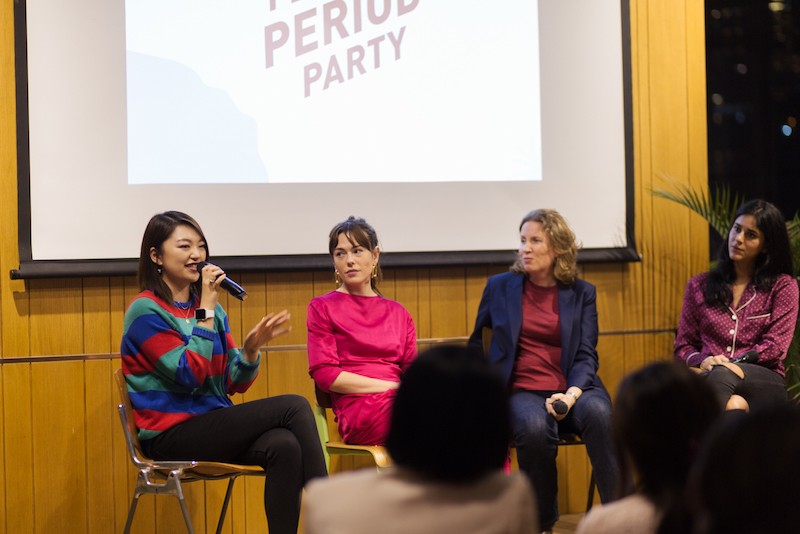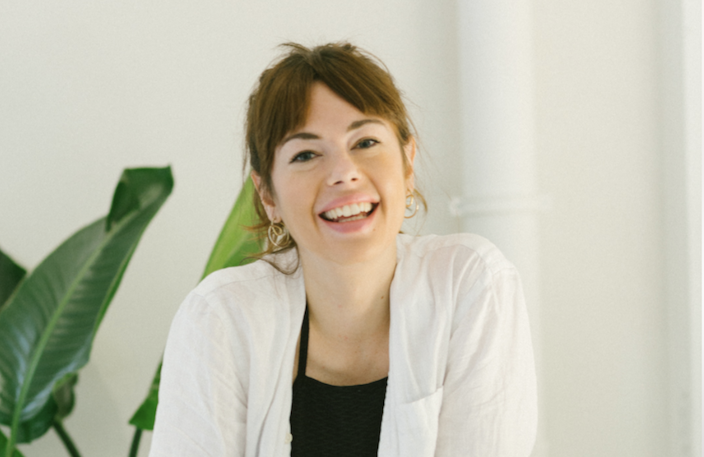Nearly half the world’s population menstruates. While this is a normal part of life for women, period symptoms such as pain and heavy bleeding are rarely discussed openly. When they couldn’t find a period brand – available in Shanghai – that provided transparency about the ingredients in their product as well as positive education about menstruation, Olivia Cotes-James and Jing Huang decided to create one. We spoke with Cotes-James about the process of developing Luuna Naturals, its products and the future of “purposeful period care.”
“We are a female-led, education-driven company that genuinely supports women and girls in need of better period management.”
What inspired you to start Luuna Naturals?
The initial idea for Luuna came when I was living in Hong Kong where I became increasingly unsettled that my friends and I had to rely on bringing tampons and other products from abroad because they were so hard to come by. It hit me that this shouldn’t be the status quo for a modern woman – in a city like Hong Kong – not to have access to basic feminine care products.
After I got a job in Shanghai, access to tampons was significantly worse. What really motivated me to do something about this was when I asked a male friend from the UK to bring some tampons back for me, and I ran over to his house one night because I really, really needed them. He looked at me blankly and said, “I thought you were joking. I didn’t bring any back.” I distinctly remember walking home thinking that I could order Starbucks on my phone and it would be waiting for me by the time I got home, but I’m without my period care products. I knew that I couldn’t be the only one feeling that way, so something had to change.

A solution to the "Period Problem." Image courtesy of Luuna Naturals
Since it’s easier to buy tampons these days, how has the idea of the brand evolved beyond that original impetus?
That incident happened three years ago. It’s different now, but that got me thinking about the feminine care industry. I started with the desire to solve the practical inconvenience of getting tampons. As I worked in branding and marketing for six years, I considered reaching out to one of the brands that I use to help them grow their presence on the ground in China. I asked myself whose branding I liked and whose purpose I aligned with, but I came to the conclusion that there isn’t anyone I could comfortably represent. At the time, I didn’t even know how the products were made that I was putting inside of my body every single month.
Then Fu Yuanhui spoke out [during the 2016 Olympics] about her period and how it affected her race time. Questioning how she could swim was such a big part of the conversation. I realized I wanted to ensure that questions like ‘how can a women swim while on her period?’ were answered for all women.
What other misconceptions about periods have you come across in your market research?
There’s a balance to strike here because, in my experience in the UK, we have this very harsh relationship with our periods where we just grit our teeth and bear it. I see more respect for the pain here, which I like, but you should never have to restrict your life for your period. In the West, however, you deal with the discomfort because you are too embarrassed to say you are on your period. Here in China, it is more prevalent to believe you are incapable of doing things because of it. You can work out, go to work and be social when on your period.

Image courtesy of Luuna
What advice would you give to women with painful periods?
We should be building a narrative that it is not normal for women to experience pain so severe that you are unable to leave the house, and you need to seek help when that happens. Many women overlook the symptoms of health issues like endometriosis, premenstrual dysphoric disorder and polycystic ovary syndrome, believing their pain to be an unavoidable result of menstruation. Often, these symptoms go untreated and can develop into chronic health issues.
Can you share some of the questions that you get from your regular events?
We had a Luuna Period Party to celebrate the release of our products and didn’t end up following the structure that we had planned because people had so much to talk about during the introductions. Questions ranged from “Is it normal that my periods have gotten a lot shorter recently?” to “Is spotting normal?” These were asked by women from many different nationalities, so it goes to show that many are lacking information from trusted resources. We are working to fill that void with regular events and helpful content on our WeChat channel.

From Luuna's Inaugural Period Party. Image Courtesy of Luuna
Do men attend these events?
We wanted to include men early on in the conversation because you cannot create change if you leave half the population out. The men who attend are curious and value the women in their lives. We also get some new fathers, and even the most reluctant attendees leave with a new respect for women’s health issues.
How would you describe the current conversation on menstrual health in China?
When we talk about the silence around this issue, it’s a global problem that is culturally nuanced. While there is a strong association here in China between tampons and sex, which leads women and young girls to believe that virgins can’t use them, the misunderstanding of the female anatomy is something that women of all cultures and backgrounds have. We are united in that, sadly, and it is something we saw that very early in our education workshops. It has a really strong impact on you as a woman when you experience this solidarity of shame, fear and confusion.
I spend my life talking about periods, and people will say, “I know you are launching a feminine care company, but do you have to talk about periods so much?” The simple answer is that I do. What I would say to all women who are lucky enough to be empowered is that we have an obligation to talk more about this.

From Luuna's Inaugural Period Party. Image Courtesy of Luuna Naturals
How do you see your company’s role in changing the conversation?
We can redefine the standards of the industry not just in China, but for Asia and beyond. There are other companies worldwide doing the same thing too, but we see our mission revolving around a concept we call “purposeful period care.” This means we are a female-led, education-driven company that genuinely supports women and girls in need of better period management, while changing the perception of how we should treat our bodies and how society views womanhood.
What are the benefits of tampons?
It’s all about choice, and there are some real issues for women who don’t know about alternatives to pads. I recently used pads again for the first time in 10 years and was reminded that my flow is too heavy to use them, which is a nightmare. Lots of women love pads, and that’s why we have them in our range. Some might dislike the stickiness when they have to sit at their desks all day, or when holidays are ruined because they can’t swim or dive. They might not want to wear yoga pants, because you can see them through your clothes, so they will skip workouts. There’s also embarrassment around smells, especially in the summer months. This all feeds into the belief that periods are frustrating and inconvenient, which affects how we feel about being women.

Image courtesy of Luuna Naturals
Why did you decide to make your products organic?
Many tampons are made of a combination of cotton and rayon. The cotton used is conventionally grown with pesticides and bleached with chlorine that is linked to health problems such as endometriosis and cervical cancer. In an independent study by Women’s Voices for the Earth, carbon disulfide was found in all four brands of tampons containing rayon. Exposure to the chemical has been associated with increased risk of menstrual disorders, early menopause and hormonal imbalances. There isn’t enough research on the dangers or safety thresholds because of the global silence around menstruation. Without transparency on how period care products are made and what is safe, women and girls around the world are left in the dark.
Whether we use pads, tampons or cups, we should consider the materials to which our vaginas are exposed. If there’s even a chance that these products could be harmful, women deserve organic options and innovations that go beyond conventional pads and tampons.
“What I would say to all women who are lucky enough to be empowered is that we have an obligation to talk more about this.”
Does that include menstrual cups?
Yes, we are launching a cup (a reusable product that collects rather than absorbs blood) and have another silicon product in development that we are really excited about. In the existing feminine care industry, there is a slow response to consumer demand. At Luuna, we want to use our close relationship with women to stay a step ahead and act as a guide.
How eco-friendly are your products?
The organic tampons are fully biodegradable because there’s no applicator. We have encountered women who have had an unpleasant first-time experience with non-applicator tampons because there isn’t enough guidance on how to insert. We have seen that with the right guidance and education, a non-applicator tampon is a convenient, comfortable and more environmentally-friendly way to experience menstruation.

Image Courtesy of Luuna Naturals
Our pads are not fully biodegradable – yet. They contain a high-performance absorbency core and organic cotton topsheet which we developed to ensure maximum protection without including nasty chemicals and synthetics. It’s our goal to create more sustainable products. When it comes to shifting the attitudes towards menstrual health, the first concern is generally improving personal health before moving on to consider the impact our periods have on the environment.
[Cover image courtesy of Luuna Naturals]
Find more information about Luuna Naturals here or scan the Luuna Naturals QR code.






















0 User Comments